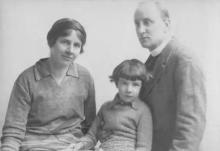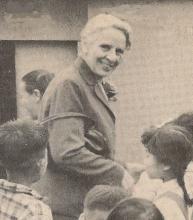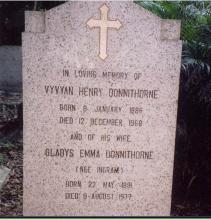Gladys Emma Ingram was born in India in 1891, and was part of a large family. Her father was a barrister. Gladys' parents, Thomas and Victoria Ingram, were close friends of William and Evangeline Booth, founders of the Salvation Army, and the family was strongly evangelical in its faith.
The family returned to England (in the early 1910s?) and she grew up in the family home at The Priory, Wimbledon, London, not far from the equally large Donnithorne family. The two families were destined to become very close as four Ingram children were to marry four Donnithorne children.
Following in the steps of an older brother who came to faith and trained as a missionary, Gladys enrolled in the Bible Training College, Clapham, London circa 1914 under its charismatic principal Oswald Chambers. It was through his teaching that she actually came to a personal faith. He nicknamed her ‘Gladiolus’ (little sword). Gladys aspired to join the YMCA work in Egypt.
In 1916 (WWI) Gladys spent a lot of time with Vyvyan Donnithorne, who was recuperating from a severe leg wound sustained in France, which ended his war. For this he was awarded the Military Cross. Gladys and Vyvyan fell in love and became engaged, only to be separated for the next three years as she went out to Egypt in February 1917 to work with Oswald Chambers. She worked first at the Alexandria Soldier’s Home and then at the YMCA centre at Zeitoun.
Oswald Chambers died prematurely in 1917, of appendicitis. Gladys bravely sang at his memorial service and gave testimony of how he had inspired her and led her into a closer walk with Jesus.
The War ended and in January 1919 an excited Gladys returned to England for her marriage. She and Vyvyan married later that year in September, and in addition Vyvyan was ordained.
In November they sailed to China to begin work in Szechuan. There he pastored the Gospel Church of Hanchow for 20 years.
In 1922 their only daughter Audrey was born while in Szechuan.
In 1925 they were captured by Red Lantern bandits with 6 other missionaries for 3 weeks before they were ransomed and rescued. Going into the 30s things became increasingly difficult in China for missionaries, both from anti-foreign feeling, feuding warlords and then from the Civil War.
Vyvyan Donnithorne was appointed as archdeacon of Western Szechuan Diocese from 1935 until 1949. In Szechuan along with a group of keen workers, the Donnithornes conducted tent meetings which lasted all day, 'and many were brought into the church.' When they left the CMS in 1946 the society expressed its gratitude and were deeply indebted for the service given by both the Donnithornes and said in a letter to them, 'Special reference should be made to Mrs Donnithorne's splendid work among the women of the Diocese and to the Bible Schools held by both Mr and Mrs Donnithorne.'
In 1949 the archdeacon happened to be in England when the Communists took over Szechuan Province and achieved supremacy in China. Gladys was in Beipei and she was interned and interrogated several times by them. Diplomatically she would say that she admired their energy. Looking back, Audrey felt it was just as well that her father was in England, as he would not have been nearly so diplomatic as his wife!
Gladys was eventually deported to Hong Kong in 1951 arriving in London that September on the City of Coventry. She was able to join her husband for his final posting pastoring a church in the Canary Isles until 1953 when they both retired to Hong Kong, and a flat in Kowloon Tong.
They remained just as busy however, leading lives of service and good works. In the 1950s and 60s Gladys persuaded Oxfam to fund a number of projects for the poor, including refugees from China to Hong Kong. Her work 'became a special concern of the Oxford Committee. If she wanted to buy some sewing machines to help some girls... if she wanted to set up an old people's home, if she wanted to find a dwelling place for a family flooded out....the Committee could be counted on to help.'
She ran the Hong Kong branch of the West China Evangelistic Band.
In 1959 Gladys opened an Old People's Home in Shatin for the elderly homeless and uncared for. The children of the nearby Shatin Babies'/Children's Home would come and entertain them with Christian songs and hymns. Gladys and Vyvyan were friends of the Home and one of the first things they did after their arrival in Hong Kong in 1953 was to assist with the furnishing of the Old Police Station at Shatin and the moving in of Mildred Dibden, her amahs and about 16 babies. They went on to serve the home as Advisory Friends.
Gladys Donnithorne also worked among the displaced and impoverished people in Hong Kong’s notorious “Walled City,” supported by the American charity World Vision. She and her husband had been the first westerners to go there. As 'a ministering angel by method and instinct', she ministered to opium addicts, orphaned children and disenfranchised Chinese. She worked with the Oriental Missionary Society’s Rooftop Programme which sought to help some of the estimated 90,000 refugees living on roofs of buildings in the resettlement blocks. For her work with the destitute and refugees Gladys was awarded the MBE by the Hong Kong government.
In 1968 Archdeacon Donnithorne died and was buried in Hong Kong Cemetery.
Gladys worked on until her death in 1977, and she was buried with her husband. The service was conducted by her pastor, Rev Bob Hyatt of St Andrews, Kowloon.
Looking back, Audrey's feeling about her parents' relationship was that they were primarily colleagues in missionary work rather than partners in home making. Her mother rather scorned the idea of being a housewife and poured herself into her missionary role, teaching the gospel to groups or individuals, speaking at meetings and doing works of mercy. Fortunately in their domestic set-up the Donnithornes had a cook and two amahs, who looked after the household side of things including the care of young Audrey, and this freed them up to do their missionary work and fully respond to their calling.
------------------------------------
Sources: www.michelleule.com; www.wikitree.com
Let My Heart Be Broken – Richard Gehman
Oswald Chambers - Abandoned to God - David McCasland
China in Life's Foreground - Audrey Donnithorne
Secret Riches - by Linda Ball
A Cause for our Times: Oxfam, the first 50 Years.
Ancestry



Comments
Gladys Donnithorne
Currently watching the Whicker's Orient TV shows filmed in 1972 and Gladys appears in the "The Freedom Swimmers" episode.
re: Gladys Donnithorne
The episode is on Youtube: https://www.youtube.com/watch?v=QG2bymHJsLg
Gladys appears at 21:20: https://youtu.be/QG2bymHJsLg?t=1280
Ancestry Records
1898 Dec 8th, London to Bombay, the Arabia, Mr T L Ingram, Mrs Ingram, 3 Misses (over 12), 5 children under 12 of which Gladys was age 7, nurse and governess.
1916 Sept 1st, dep London for Port Said, Egypt, the Medina, Miss Gladys Emma Ingram 25, occupation - Worker at Soldiers’ Home.
1919 Dec 9th – dep Liverpool for Canada, the Empress of France, Mr H Donnithorne 33, Missionary, Mrs Donnithorne 28, Housewife, (presumably for HK).
1921 Census - Thomas Lewis Ingram 82, retired barrister, born The Gambia 1839, with wife Victoria 65, 3 daughters and a son and 4 servants. (Gladys in China).
1921 Oct 18th - Death of Thomas Lewis Ingram (her father) of The Priory, Wimbledon Common, Nat Probate Records.
1927 Apr 21st, arr London from Shanghai, the Mongolia, Mr V H Donnisthorne (sic) 41, clergyman, Mrs G Donnisthorne 35, home duties, Master(sic) A Donnisthorne 4, scholar, destination Creatway House, Dover House Road, SW15. Country of Res China.
1929-30 UK Electoral Register – Vyvyan H Donnithorne, Gladys Emma Donnithorne, residing Anshien, Stoke Road, Stoke Poges.
1935 Jul 1st, arr London from China via Canada, the Alaunia, Vyvyan Donnithorne 49, clergyman, Gladys Donnithorne 44, missionary, destination The Priory, Wimbledon Common, London. (The home of the Ingram family right through to 1940's)
1936 Oct 3rd, dep Southampton for China via Canada, the Empress of Britain, Vyvyan Donnithorne 50, clergyman, Gladys Donnithorne 45, housewife, from c/o Church Missionary Society, Salisbury Square EC4, intended perm res China.
1943 Nov 25th - arr Glasgow from Bombay, the Nea Hellas, The Ven Archdeacon Donnithorne 56, clergyman, Mrs Gladys Donnithorne 51, housewife, destination Hilltop Cottage, Warboys Road, Kingston Hill, Surrey. (Back in Britain 1943-45)
1945 Nov 13th, dep London for China, the Drottningholm, Vyvyan H Donnithorne 59, missionary, Gladys E Donnithorne 54, housewife, from 48a High Street, Wimbledon.
1951 Sept 22nd arr London from Hong Kong, the City of Coventry, Mrs Gladys Donnithorne 60, Missionary, destination c/o Mrs Crofts, Westow, Barham Road, Wimbledon Wood, London SW20.
1952 Dec 12th, dep Southampton for Hong Kong, China, the Carthage, Vyvyan H Donnithorne 66, clergyman, Gladys E Donnithorne 61, housewife, from 65 Blenheim Terrace, NW8.
1953 Electoral Register Vyvyan H Donnithorne, Gladys E Donnithorne, 3 Boundary Road, St Marylebone, London.
1953 Electoral Register Vyvyan H Donnithorne, Gladys E Donnithorne, 3 Blenheim Terrace, St Marylebone, London.
There are more passenger lists but these are records in Canada and America to which I don’t have access.